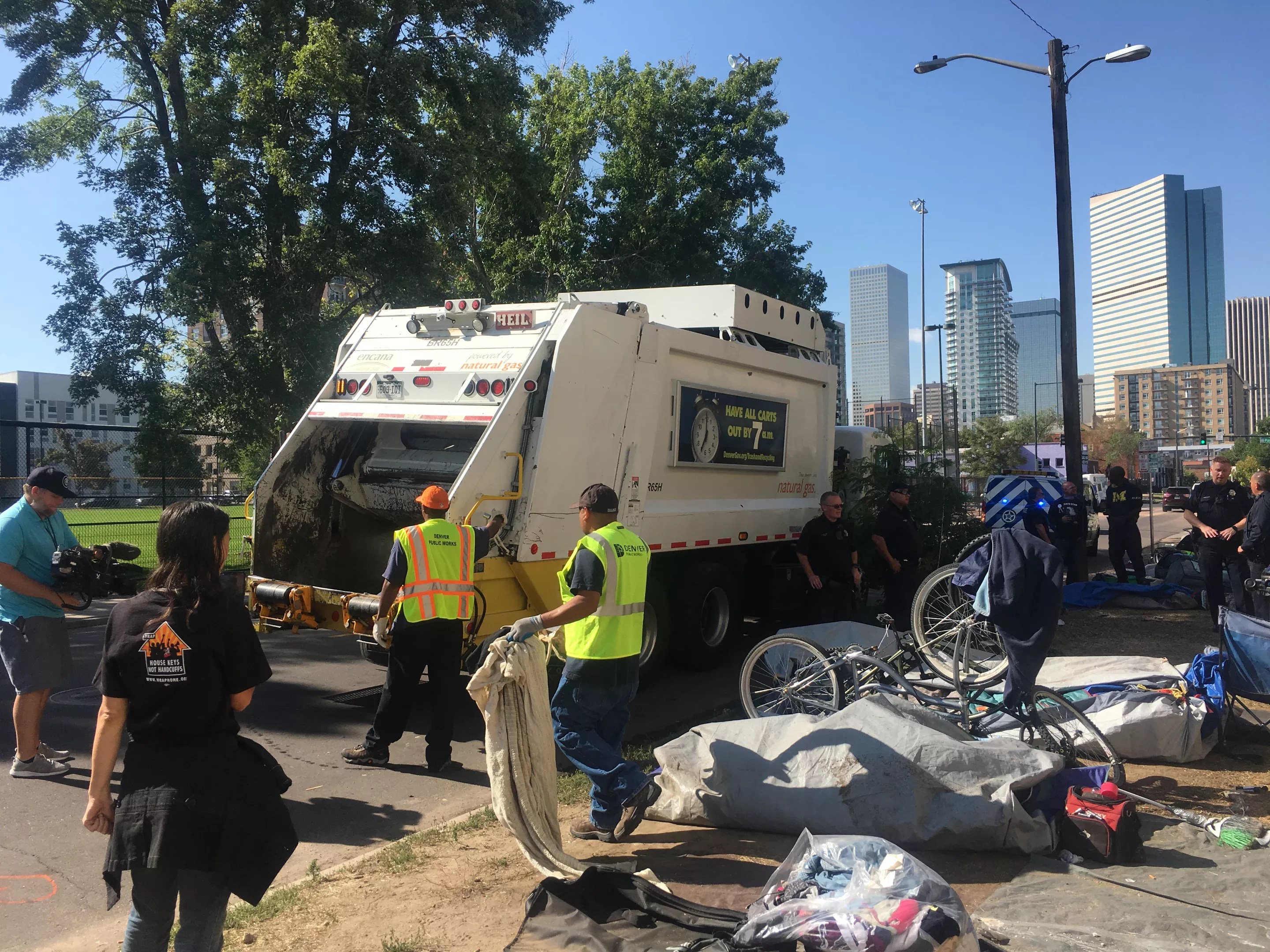
Sara Fleming

Audio By Carbonatix
A Denver civil-rights law firm filed a motion in municipal court on Tuesday, September 10, challenging the constitutionality of the city’s urban camping ban. Andy McNulty, an attorney with Killmer, Lane & Newman, LLP, is defending Jerry Burton, who was ticketed for sleeping outside on April 29. McNulty filed a motion to dismiss the case against Burton on the grounds that the camping ban is unconstitutional.
Burton was ticketed while camping near 29th Street and Arkins Court with a group, after the city had pushed them out of Curtis Park. Burton had played a significant role in helping keep his camp, known as Jerr-E-Ville, clean and orderly.
The motion is awaiting a hearing. If one is granted, McNulty is hoping that the camping ban, which was signed into law in 2012 and upheld by a vast majority of Denver voters after Initiative 300 (known as “Right to Survive”) failed this May, could be struck down by the court.
Ryan Luby, a spokesperson for the Denver City Attorney’s Office, wrote in an email to Westword that the city cannot comment on the litigation because it is an ongoing case in criminal court, but said, “We believe the ordinance is constitutionally sound.”
McNulty’s motion makes 49 pages of arguments to the contrary. The most important part of his case, he says, is that the camping ban violates the Fourteenth Amendment’s Equal Protection Clause.
“[The camping ban] is targeted at a specific discrete group of people who had no political power, because people with political power wanted those people to be forced out of the city of Denver,” he says. The camping ban is technically neutral on who it criminalizes, outlawing any act of “resid[ing] or dwell[ing] temporarily in a place, with shelter,” where shelter is defined as “any tent, tarpaulin, lean-to, sleeping bag, bedroll, blankets, or any form of cover or protection from the elements other than clothing.”

City officials enforced the camping ban in a sweep at 24th and California this morning, September 11.
Sara Fleming
Yet from the beginning, McNulty argues, the ban was targeted toward people experiencing homelessness. According to the motion, it was inspired by a trip that then-Councilman Albus Brooks (who was defeated this year by Candi CdeBaca) took to the 16th Street Mall, where he was shocked by the number of homeless individuals there. Brooks, Hancock and other city leaders repeatedly framed the ban as a way to remove homeless people from the view of high-profile downtown businesses and public attractions, and it was passed by Denver City Council in May 2012. Since then, McNulty writes, it has overwhelmingly been used to target people experiencing homelessness, with 12,000 camping-ban contacts with homeless people since it was enacted. (The ban is mainly enforced through written or verbal warnings, rather than citations or arrests.)
“You can’t discriminate against people based on who they are,” McNulty says. He argues that homeless individuals should be considered a “suspect or quasi-suspect class” under the law, and thus deserve protection from targeted discrimination. That classification may get a boost from the class-action lawsuit for which McNulty helped attorney Jason Flores Williams reach a settlement in March. In that case, the court did grant class-action status to six plaintiffs representing all of Denver’s homeless. The settlement for that lawsuit, which requires that the city give notice before taking people’s property, is set to go into effect at a hearing on September 23.
“This is just the next step to ensuring that Denver doesn’t continue to violate homeless individuals constitutional rights just because they’re a voiceless group of people,” McNulty says. He also argues that the ban violates homeless people’s due process, their right to bodily integrity and privacy, and constitutes cruel and unusual punishment under the Eighth Amendment.
McNulty’s motion gives reasons for why so many people are living on the streets, citing Denver’s rent spike and consequent affordable housing crisis; a lack of adequate shelter space and access; and problems with safety and emotional well-being in shelters. “Given the abject lack of shelter beds in the city of Denver, Mr. Burton had no choice but to sleep outdoors,” the motion states. Burton had reportedly previously refused to go to a shelter because of prior shelter experiences “where his health, wellness, and personal autonomy were compromised.”
“What prevents homelessness is housing. We need to stop this enforcement of the camping ban, which eats up valuable city resources…and use that money to fund proven solutions like housing,” McNulty says.